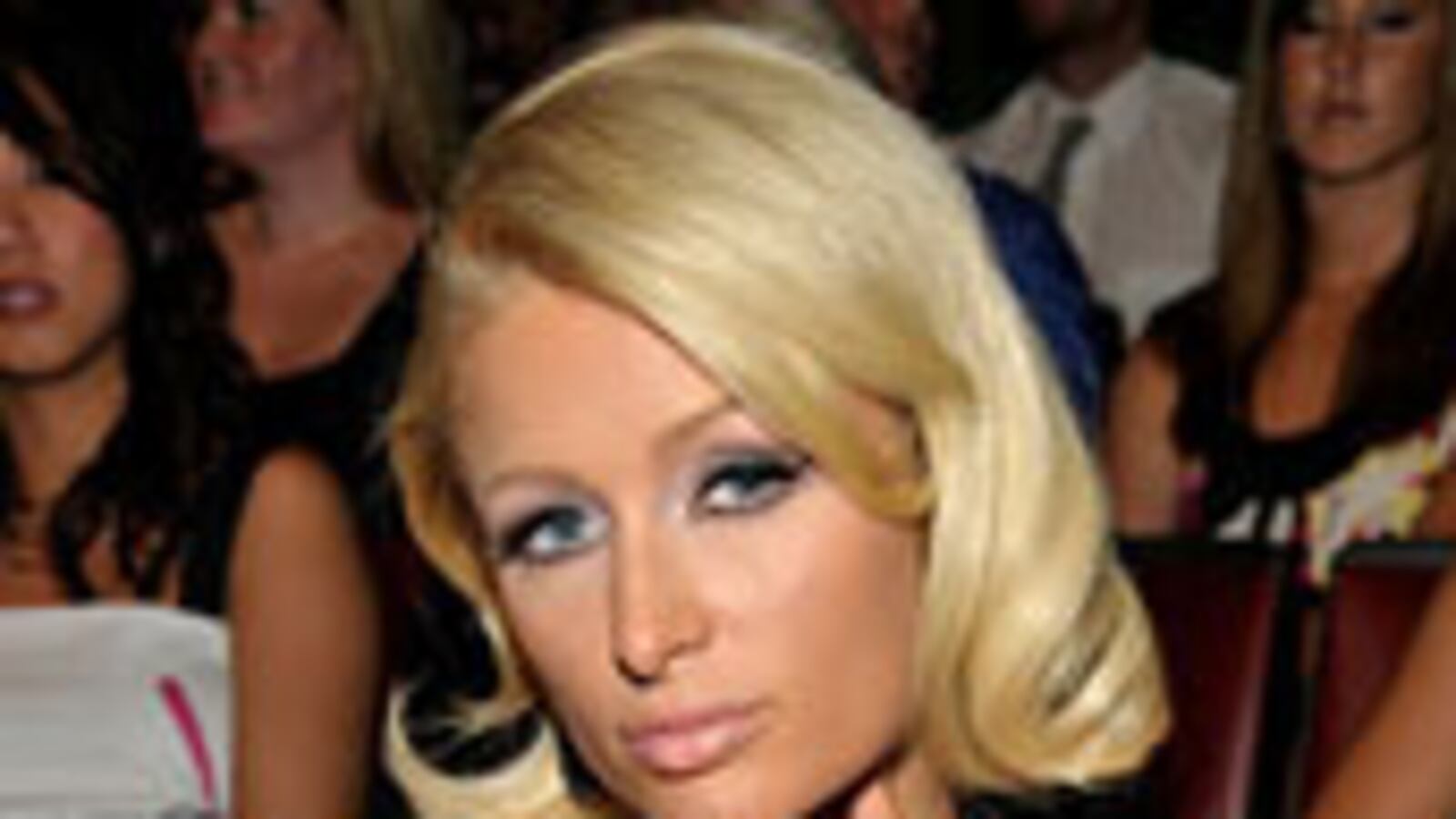Plus: Check out Book Beast, for more news on hot titles, authors and excerpts from the latest books.

Most journalists would rather interview A-list celebrities than dour economists, but the Hollywood beat is not always so glamorous. Mark Ebner, bestselling author and TruTV host, has made a career of dredging up stories from Hollywood’s shadows. Yesterday saw the release of Six Degrees of Paris Hilton: Inside the Sex Tapes, Scandals, and Shakedowns of the New Hollywood (Simon Spotlight Entertainment, $24.95), which connects the titular heiress to various denizens of the blood- and drug-soaked underworld.
The story centers around Darnell Riley, an extortionist, debt collector and double-murderer who is currently incarcerated for holding Girls Gone Wild CEO Joe Francis at gunpoint for six hours, sexually humiliating him on camera, and demanding more than $500,000 to keep the video offline. Riley inexplicably worked his way into Paris Hilton’s social circle. (When Hilton learned that he had killed two people, she supposedly replied, “That’s hot,” according to one of Ebner’s sources.)
I have been on the story for a stressful three years now—but, as I always say, “Suicide by media can take a lifetime.” I only hope that I don’t see the bullet coming.
Riley claims he had sex with Hilton and fellow Simple Life star Nicole Richie—who denies knowing him—and facilitated the deal for the infamous 1 Night in Paris home video. The New York Post reported that he blackmailed Hilton for $20,000 per month over a tape of her using the N-word, and Hilton was subsequently responsible for Riley’s arrest over the Francis tape, according to Ebner. (Hilton threatened to sue over the book, but “scotched that idea out of concern that Darnell Riley would kill her,” Ebner told BigHollywood.com.)
The book follows Riley’s rise from teenaged jewel thief to Hollywood high-lifer who cavorted—or supposedly cavorted—with the likes of Mickey Rourke, Denzel Washington, Robert Downey, Jr., Leonardo DiCaprio, Fergie, Naomi Campbell, Christina Ricci, Pauly Shore, Donatella Versace and Pamela Anderson. It’s an incredible story, and Ebner takes the reader on a whirlwind tour from the red carpet to the federal penitentiary.
You exchanged more than 70 letters with Riley and conducted numerous jailhouse interviews with him. He even gave you access to his cellphone, which contains text messages from Hilton’s former number. Why did he trust you with his story?
Darnell Riley had actually been reading my stuff from behind bars—unlike most of the characters in the book, he actually reads—and I think we came together out of respect for and curiosity about each other’s “work.” Darnell is smart enough to know that, by participating, he could literally tell his story. The others who wouldn’t speak to me missed the opportunity to explain themselves as “lovable rogues.”
Darnell emerges as a fascinating and complex character. He volunteers for charities—such as after-school reading programs—and can quote from memory To Kill a Mockingbird, Huckleberry Finn, The Art of War, Cat on a Hot Tin Roof, The Great Gatsby (a childhood favorite), and Plato’s Republic… yet he has robbed, blackmailed and killed people. Does he strike you as the “literary hero” he apparently considers himself?
I see him as a literary anti-hero in the same way Jimmy McNulty [of The Wire] and Vic Mackey [ The Shield] are written as such for television.
Judging from your book, it seems as if the grass is always greener: The Hollywood crowd idolizes criminals—and craves proximity to their dangerous “authenticity” and “credibility”—while the criminals long for fame, desperately pitching their life stories to movie studios and paying the paparazzi to take their photos.
There’s the cliché about bank robbers going where the money is. The sociopaths featured in my book go to Hollywood, and their validation is the same: money. … The rich and famous people consorting with these dangerous interlopers don’t necessarily deserve what they get, but they do set themselves up for it—repeatedly.
You speculate that Darnell wants to become famous. When he told you that Pamela Anderson complimented the size of his member, or that he had public sex with Paris Hilton, or that Denzel Washington and Robert Downey, Jr. encouraged him to become an actor/screenwriter, or that he strong-armed Sean “Diddy” Combs and Stevie Wonder into forking over money, were you skeptical?
Darnell Riley gave me no reason to believe that he was lying about anything. When he was shading the truth, he let me know that he was doing so because the statute of limitations on certain crimes discussed had not yet run out. I did my best to verify everything… Did he try and trick me? Never.
Everyone mentioned in the book was contacted. Stevie Wonder's people said they would not confirm or deny, but then I got the story second-sourced. Washington trained at the same gym, which was confirmed by the gym owner. [Downey] does that with everyone he meets or befriends. [As for Anderson:] There is no rebut there.
Much of the story takes place “before Paris Hilton was Paris Hilton.” Now that she is a worldwide celebrity, has she washed her hands of the underworld?
She was recently burglarized again to the tune of a reported $2.5 million in cash and jewels. … [S]he obviously still allows the criminal entourage element to use her washroom. Paris Hilton knows that if she cleans up completely, she won’t make news—and that is career suicide for her. [According to police, “a man in a hooded sweatshirt and gloves forced entry through the front door of her house and proceeded to ransack her bedroom.”]
A LAPD detective told you to carry a gun while dealing with some of the people in the book, and you received both legal and “non-legal” intimidation. Were you scared while working on this? Are you now?
Being scared of the punks in my book would be like being scared of the bullies in high school, except now they have money. I knew how to leverage those punks then, and I know how to do it now.
One of the people you profile, a wealthy socialite, plays hardball by suggesting she is good friends with the majority owner of your publisher’s parent corporation. Does this kind of thing happen to you often?
That’s pretty much the story of my professional life, and to go into all the pushback I’ve gotten from lawyers, flacks and the subjects of my work would take bandwidth that The Daily Beast might not care to spare. One chapter concerning a man powerful enough to wipe his ass with Sumner Redstone’s balance sheets was spiked by my publisher’s legal department. … I’ll probably release that on the Internet, tagged to my paperback release.
Did the legal department have a heart attack over this book? (Ebner posted one excised chapter on his website.)
We basically did a painstaking, line-by-line vetting by phone with one of the best First Amendment attorneys in the country. [ 1 Night in Paris costar Rick] Salomon’s attorney threatened to sue, claiming that his client had no association with Darnell Riley. I came up with a $10,000 check from Salomon to Riley. That was one of my all-time “shut the fuck up” moments.
Darnell says if he weren’t working Hollywood, he would have been one of the Enron guys. Is there a psychological link between him and someone like Bernie Madoff?
As long as there are vulnerable marks, there will always be con artists. This is the inescapable fact proven repeatedly throughout history.
Paris seems to have cooled her partying over the past few years, and she had her teary-eyed moment after the DUI imprisonment. Most people regret the recklessness of their early twenties; does she deserve our sympathy?
Why on earth would anyone sympathize with a woman who has enjoyed almost a decade-long run that has turned her into one of the most recognizable brands in the world? I feel nothing for her. … My hope is that, in the future, everyone will be anonymous for 15 minutes.
She has said it takes a lot of brains to play dumb. It must take some business acumen to earn hundreds of thousands of dollars for a 15-minute public appearance…
Apart from surrounding herself by savvy businesspeople, I see no evidence of intellect roiling in that pretty little head of hers.
Is there any chance history will judge her kindly as a post-modern performance artist like Madonna who valiantly spat in the face of social conservatism?
Not if I can help it.
Skipping topics for a moment, you had major reservations about working for the National Enquirer at one point, even though it made you a “rock star” in the Midwest. Why is one kind of gossip publication disparaged by the educated classes on the coasts, while others (Page Six, Gawker, etc.) are considered “sophisticated”?
When you take into account the Enquirer circulation, those who claim they never read the rag are the same people who buy Penthouse “for the stories.” The difference is that Gawker readers buy Playgirl for the stories.
You produced a version of Darnell’s story for Dateline on NBC, you did a version for VH1, and now it’s a book. Are you done with these characters now, or do you expect to find yourself sucked into their world somewhere down the road?
I have been on the story for a stressful three years now—but, as I always say, “Suicide by media can take a lifetime.” I only hope that I don’t see the bullet coming.
Marty Beckerman is the author of Generation S.L.U.T. (MTV Books) and Dumbocracy. (Disinformation). He has written for Playboy, Discover, Radar and Huffington Post, and has been featured by The New York Times, MSNBC, ABCNews.com and National Public Radio. His website is www.MartyBeckerman.com.





